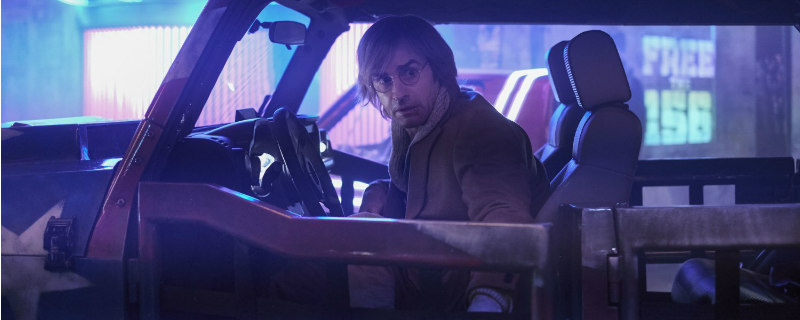
Review by Eric Hillis
Directed by: Duncan Jones
Starring: Alexander Skarsgård, Paul Rudd, Justin Theroux, Robert Sheehan, Seyneb Saleh, Noel Clarke, Dominic Monaghan

Hot on the heels of Bright and The Cloverfield Paradox, another piece of big budget sci-fi fantasy finds itself debuting on Netflix. Remarkably, writer/director Duncan Jones' Mute is even worse than the aforementioned critical - if not commercial (who knows what constitutes a financial success in the mysterious world of the streaming service?) - flops.
An opening flashback features a young Amish boy surviving a boating accident that renders him with the titular affliction, his family refusing to have an artificial voicebox fitted on religious grounds. Cut to the present, or in this case the future, and the boy in question has grown up, up and up into the lanky stature of Leo (Alexander Skarsgård), now working as a bartender in a raucous Berlin nightclub.

Maintaining his family's Amish tradition, Leo is still mute, and refuses to interact with the technology that's all around him in the German capital. When his coworker and girlfriend, Naadirah (Seyneb Saleh), mysteriously vanishes, Leo begins an investigation into her whereabouts, but finds his lack of a voice and unfamiliarity with everyday technology proving considerable obstacles in his path.
Meanwhile we spend much time in the irritating company of Cactus (Paul Rudd) and Duck (Justin Theroux), a pair of AWOL US military surgeons clearly modelled on the beatnik medics essayed by Elliott Gould and Donald Sutherland in Robert Altman's M*A*S*H.

The premise of a luddite forced to come to terms with technology as part of an investigation is one with much potential, but it's largely squandered by Jones. The closest the movie comes to an interesting sequence involves a French Connection style chase as Leo pursues a food-delivering drone in an attempt to arrive at his girlfriend's address. Less successful is the mute aspect of Leo's character, which does little but add running time to an already snail-paced narrative, as our hero communicates by writing down notes and asking strangers to speak into voice recognition devices.
There's a touch of Southland Tales, Richard Kelly's disastrous 2006 sci-fi drama, to Mute. It shares that film's misjudged tone and its woeful attempt to balance comedy with dark themes and violence. Much of the tone deaf comedy here comes from kink-shaming and the sort of gay panic humour that died out with the Police Academy series. Elsewhere a pedophile subplot is handled in a bafflingly superficial manner and a cameo by Sam Rockwell's character from Jones' debut Moon raises unnecessary and distracting questions as it hints at a more interesting drama we're missing out on.

I'm not entirely sure why Mute is set in Berlin. Maybe it's because Jones is the son of David Bowie, or because it riffs on Graham Greene (The Turd Man anyone? Anyone?), or simply because the city gave Netflix a good deal? The geographical setting leads to a cumbersome linguistic inconsistency, with characters flitting between English and subtitled German on a seemingly random basis. It rarely justifies its futuristic setting either. Save for those flying food orders, there's not much in the way of tech that we don't already possess today, and a mute Amish man would face the same set of obstacles in 2018 as in this ambiguous future, whose production design boasts one of the laziest Blade Runner knockoffs imaginable.
Presumably in expectation of negative reviews, Jones took to twitter to post an image of a jar of Marmite labelled with the film's title and the logline "You are going to love it... or hate it." I doubt too many viewers will fall into the former category.

Mute is on Netflix now.

